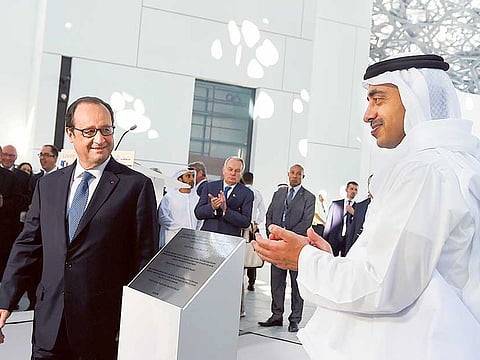Museums invited to become safe havens for artefacts from conflict zones
As per Abu Dhabi Declaration, cultural property to be kept on own territory if deemed safe at national level

Abu Dhabi
Museums across the world were invited by France and the UAE on Saturday to join an international network and act as safe havens for cultural artefacts from conflict zones.
The network will be used to temporarily store endangered items of heritage and importance during periods of conflict, restore them if needed, and safely return them to their rightful owners after the conflict has been resolved, delegates at the Safeguarding Endangered Cultural Heritage conference in Abu Dhabi were told.
The Abu Dhabi Declaration, launched at the conclusion of the two-day meeting, specified that cultural property will be kept on its own territory if deemed safe at a national level, or in a neighbouring country, or in other countries as a last resort.
Speaking at the conference, French President Francois Hollande said the storerooms of the Louvre Museum in Paris would provide safe haven for cultural treasures.
Rino Buchel, head of protection of cultural property at the Swiss Federal Office for Civil Protection, also spoke about similar services available near the Swiss city of Zurich.
“We have underground sites 50 kilometres away from Zurich that are 400 square metres each, and can be used to store monuments at an annual cost of $24,000 [Dh88,080]. These facilities are easy to access throughout the year, and are also protected in coordination with security forces,” said
The sites are managed with the United National Educational, Scientific and Cultural Organisation (Unesco) as patron, and are secured in Switzerland under customs laws governing free zones, he added.
Buchel also advised other museums and interested parties that hope to join the network to recruit specially trained personnel who can conserve and restore any artefacts that are kept, as well as conduct any required research.
Jean Yves Marin, director of Switzerland’s largest art museum, the Museum of Art and History in Geneva, explained that the concept of sending cultural treasures abroad during conflict was first discussed in 1939 during the Spanish Civil War.
“More recently, hundreds of artefacts were transferred to Geneva from Gaza, and these pieces were part of a 2007 exhibition attended by [Palestinian president] Mahmoud Abbas. We hope to return them to The Palestine Museum near Ramallah next year,” he added.
Experts added that international laws also need to be strengthened to create an environment of trust that can facilitate the transfer of precious cultural pieces.
“There is always a risk that the items will be hard to get back, but the situation is less risky now. For example, many pieces from Afghanistan that were transferred to Geneva during the 2001 invasion of the country were safely returned,” Marin said.
Laurence Engel, president at the National Library of France, also urged that artefacts stored in safe havens be displayed so that people are aware of their existence and value.
Sign up for the Daily Briefing
Get the latest news and updates straight to your inbox



